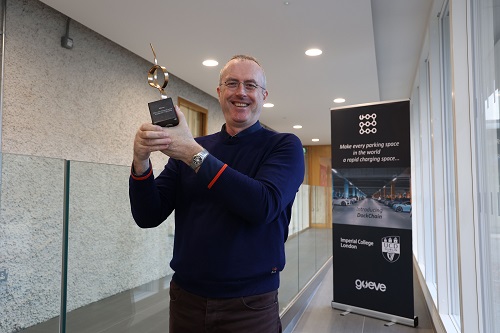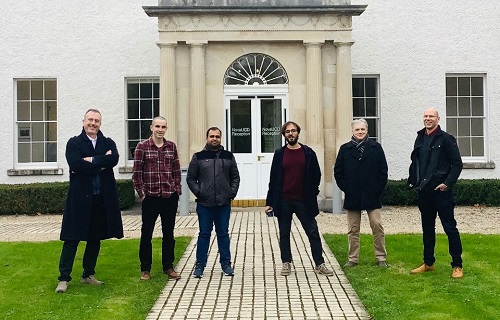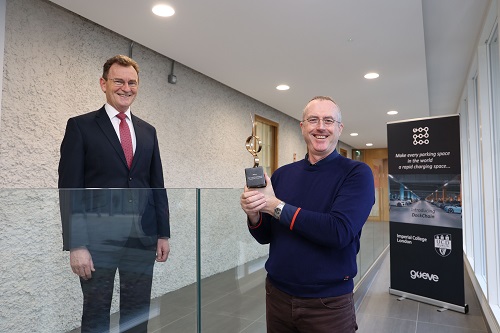
Start-Up Developing a Novel Electric Vehicle Charging System Wins UCD’s 2021 Start-Up of the Year Award
- Go Eve, a joint UCD and Imperial College London start-up, is seeking to raise €3 million in seed funding
Go Eve a start-up focused on bringing a novel electrical vehicle (EV) charging system to market has today been declared winner of the 2021 University College Dublin (UCD) Start-Up of the Year Award.
Go Eve, a joint UCD and Imperial College London start-up, won the Award, and a €32,000 prize fund, after being declared overall winner of the 2021 UCD VentureLaunch Accelerator Programme. The annual Programme, which is run by NovaUCD, aims to support the creation and launch of sustainable and profitable new start-ups emerging from the University.
The availability, reliability and associated costs of charging points remain an issue for EV owners. While AC charging options are inexpensive, they are also slow, and DC charging options while fast are expensive and can only electrify a couple of parking spaces at a time.
Go Eve is focused on commercialising a patent-pending ‘DockChain’ technology for charging EVs at scale. The DockChain innovation allows multiple parking spaces to be rapidly ‘electrified’ from one base power source with a daisy chain of inexpensive and simple charging points. The technology can significantly reduce the costs involved with charging large numbers of EVs, or where rapid vehicle turnaround is required, and can remove the operational inconvenience of moving vehicles around chargers.
To find out more about Go Eve and the DockChain technology watch this short VentureLaunch video:
The technology was originally invented by a team of academics and researchers led by Professor Robert Shorten at the UCD School of Electrical and Electronic Engineering. Professor Shorten subsequently moved to Imperial College London where the technology is being further advanced by him and his team. Go Eve is currently in the process of spinning-out from both universities as well as formalising the required knowledge transfer and intellectual property licence to the start-up.
Go Eve was founded by Hugh Sheehy, who completed the UCD VentureLaunch Accelerator Programme, John Goodbody, Professor Robert Shorten, Dr Pietro Ferraro and Andrew Cullen.

Pictured (l-r) at NovaUCD are members of the Go Eve team; Hugh Sheehy, Andrew Cullen, Ammar Malik, Dr Pietro Ferraro, Prof. Robert Shorten and John Goodbody
Hugh Sheehy, CEO and co-founder, Go Eve said, “We are truly honoured to have won the 2021 UCD Start-up of the Year Award. Our vision at Go Eve is to make every parking space capable of charging an EV using the DockChain technology. This technology makes rapid DC charging possible for all parking spaces at little more than the cost of today’s slow AC charging infrastructure.”
“The technology has the potential to open up a whole number of use-cases, especially where large volumes of EVs are parked, such as for car rental fleet operators, large destination car parks in hotels and office buildings. Many other applications are being examined, from municipal parking to advanced Vehicle-to-Grid solutions."
He added, “We currently plan to run three pilot programmes with three customers during 2022 and we are now seeking to secure seed investment of €3 million to support these pilot programmes, to support further product development and design and team expansion.”
He concluded, “I would like to acknowledge the fantastic support and encouragement provided by NovaUCD, all the VentureLaunch programme facilitators, and the other VentureLaunch participants through their invaluable feedback and support throughout the programme.”
The main objective of the UCD VentureLaunch Accelerator Programme is to equip participants with the knowledge, skills and understanding that will be required to work as part of a team leading a new commercial venture. On completion of the programme the expectation is that participating new ventures will have developed a commercially viable business plan.
The programme consisted of eight workshops delivered over a two-month period from October to November at NovaUCD. The Business Model Canvas approach to start-up development forms the basis of the programme with each session consisting of a mix of taught content and interactive workshops delivered by external experts as well as involving talks from entrepreneurs. Participants also gain expert mentoring on marketing, finance and funding, sales and pitching to investors.

Tom Flanagan, Director of Enterprise and Commercialisation, NovaUCD and Hugh Sheehy, CEO and co-founder, Go Eve
Tom Flanagan, Director of Enterprise and Commercialisation, NovaUCD said, "Each year we support members of our research and entrepreneurial communities who want to accelerate the creation of exciting new start-ups through our VentureLaunch Accelerator Programme."
He added, "Given the importance of climate action it is fantastic to see Go Eve which is developing an innovative technological solution in the area of sustainability win this year's programme. We are also delighted to be working in collaboration with our colleagues in Imperial College London to commercialise this exciting DockChain technology. It has the potential to make a significant impact on how EVs are charged."
He concluded, "I wish Go Eve, and all the participants on this year's programme, every commercial success, here in Ireland and internationally, in the years ahead."
Dr Rebeca Santamaria-Fernandez, Director of Industry Partnerships and Commercialisation - Engineering, Enterprise, Imperial College London, said, “We are thrilled to be part of Go Eve’s journey towards becoming an impactful business aiming to have a positive effect on our climate. We believe the technology can significantly reduce the costs involved with charging large numbers of EVs. Go Eve joins a long list of Imperial start-ups focused on supporting the transition to a zero pollution future and we look forward to supporting the company over the coming years.”
“We are proud to collaborate with NovaUCD to enable Go Eve’s work and the DockChain technology to go further and have an impact.”
In addition to the 2021 UCD Start-up of the Year Award Go Eve receives a cheque for €10,000 sponsored by AIB, a professional services package to the value of €10,000 sponsored by Bryan Maguire Business Consulting and Deloitte and incubation space at NovaUCD to the value of €12,000.
The 2021 UCD VentureLaunch Accelerator Programme evaluation panel, which selected the overall winner following pitches by the eight finalists, was chaired by Dr Helen McBreen, Investment Director, Atlantic Bridge. The other members of the panel were; Denis Dudley, AIB; Caroline Gaynor, Lightstone Ventures; Dr Sharon O’Kane, LivaNova and a NovaUCD Entrepreneur-in-Residence, and John O’Sullivan, ACT Venture Capital.
The other participants on this year’s programme in addition to Go Eve were, Blood Brothers, Eofis, FeetAI, giyst, La Casa, Nightleaf and PEARlabs.
To find out more about all the participating ventures watch our 2021 UCD VentureLaunch Accelerator Programme Awards video
Blood Brothers, FeetAI, giyst, La Casa and Nightleaf are currently being supported through the Enterprise Ireland Commercialisation Fund.
#VentureLaunch21
ENDS
1 December 2021
For further information contact Micéal Whelan, Communications and Media Relations Manager, NovaUCD, UCD Research and Innovation, e: miceal.whelan@ucd.ie.
Editors Notes
The other participants on the 2021 UCD VentureLaunch Accelerator Programme, in addition to Go Eve, are profiled below.
Blood Brothers is developing an employee health and wellness benefits solution for men. Blood Brothers was founded by Dr Harriet Treacy and Peter Lumley working alongside Professor Carel Le Roux, UCD School of Medicine and the UCD Diabetes Complications Research Centre.
Eofis is developing a corporate e-learning app, using automatic quiz generation and an optimal, efficient, and lightweight learning schedule, to greatly improve employees’ retention of vital content. Eofis was founded by Marysol Angeloni, a postgraduate student in the UCD Michael Smurfit Graduate Business School, and Tiarnach Ó Riada, a graduate of the UCD School of Electrical and Electronic Engineering.
FeetAI is using artificial intelligence (AI), machine learning and computer vision technology to support children’s footwear fitting. FeetAI is developing SizeWise, a digital platform that allows a parent to scan their child’s foot from a smart phone, builds a 3D model of the foot, and presents a recommended shoe size for their child, accommodating for healthy growth. Alan Power, UCD School of Computer Science and CeADAR, Ireland’s Centre for Applied AI, is the founder of FeetAI.
giyst generates automated AI-powered video summaries to drive discovery and enable efficient consumption of the essence of content. Unlike the limits of manual summarization, giyst’s technology creates endless volumes of human-quality video summaries in real time. giyst founders are Avril Power, Colm Murphy, and Dr Ricardo Simon Carbajo, UCD School of Computer Science and CeADAR, Ireland’s Centre for Applied AI.
La Casa is developing a care platform to improve the wellbeing of older people so that they can live independently in their own home for as long as possible. La Casa was founded by Richard Cooke, Rodd Bond, and Paul Boland, UCD School of Computer Science and CeADAR, Ireland’s Centre for Applied AI.
Nightleaf is developing a highly innovative wearable device, based on the principles of design thinking and value driven care, to revolutionise healthcare for Dry Eye disease patients by providing them with an effective overnight treatment. Nightleaf’s founders are Sinéad Buckley and Steve Cullen, UCD School of Mechanical and Materials Engineering who identified this unmet clinical need while on the BioInnovate Ireland Fellowship.
PEARlabs has developed a novel photonic chip which enables ultra-high spatial resolution at video rates in optical microscopy, far beyond the diffraction limit of visible light. PEARlabs was founded by Professor Dominic Zerulla as a spin-out from the UCD School of Physics. Jürgen Osing, who recently joined PEARlabs as a commercialistion expert is participating on the programme along with Professor Zerulla.
At NovaUCD, the hub for new ventures and entrepreneurs at University College Dublin, we nurture and support new high-tech companies as part of UCD's mission. At NovaUCD we provide purpose-built, state-of-the-art incubation facilities alongside a comprehensive business support programme for client companies along with a series of programmes, such as the UCD VentureLaunch Accelerator Programme, to assist entrepreneurs establishing start-ups. NovaUCD has been funded through a unique public-private partnership that includes AIB Bank, Arthur Cox, Deloitte, Enterprise Ireland, Ericsson, Goodbody Stockbrokers, UCD and Xilinx. www.novaucd.ie
